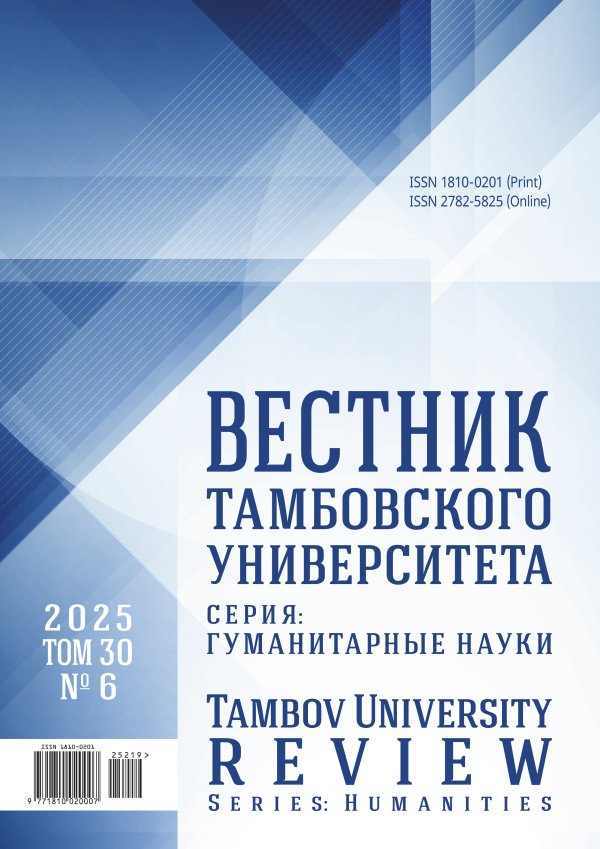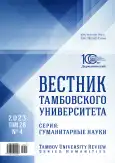Концепция «нового похода» в официальной трактовке истории Коммунистической партии Китая
- Авторы: Скосырев В.А.1
-
Учреждения:
- ФГАУН «Институт Китая и современной Азии Российской академии наук»
- Выпуск: Том 28, № 4 (2023)
- Страницы: 1000-1009
- Раздел: ИСТОРИЯ ЗАРУБЕЖНЫХ СТРАН
- URL: https://bakhtiniada.ru/1810-0201/article/view/298027
- DOI: https://doi.org/10.20310/1810-0201-2023-28-4-1000-1009
- ID: 298027
Цитировать
Полный текст
Аннотация
Актуальность. В работе анализируется идеологема «нового похода» Коммунистической партии Китая (КПК). В последнее время это словосочетание часто звучит в речах руководителей Китайской Народной Республики (КНР) и активно продвигается партийными органами пропаганды. Цель исследования – проследить процесс развития выражения «новый поход» в идеологическом поле КНР и определить ключевые смыслы, которые вкладываются в концепцию.Материалы и методы. Для достижения обозначенной цели проанализированы речи руководителей КНР 1996, 2006 и 2016 гг. по случаю круглой годовщины окончания Великого похода китайских коммунистов 1934–1936 гг., с которым связана идеологема «нового похода». С помощью качественного и количественного контент-анализа выделяются общие и особенные для трех текстов моменты. Показано, каким содержанием наполнялась концепция «нового Великого похода». Также прослежено возникновение в официальных источниках термина «новый поход» и выделены идеи, которые партийные теоретики связывают с этим выражением.Результаты исследования. Установлено, что идеологема смещает акцент с достижений предшествующего периода развития страны на грядущие успехи социалистического строительства в «новую эпоху», провозглашенную нынешним генеральным секретарем ЦК КПК Си Цзиньпином.Выводы. Возникновение концепции «нового похода» свидетельствует об отдельных изменениях в том, как КПК позиционирует себя в истории Китая. Дальнейшему исследованию подлежит влияние этой трансформации на идеологию КНР в целом.
Ключевые слова
Об авторах
В. А. Скосырев
ФГАУН «Институт Китая и современной Азии Российской академии наук»
Автор, ответственный за переписку.
Email: skosyrev@iccaras.ru
ORCID iD: 0000-0001-6787-1773
научный сотрудник Центра мировой политики и стратегического анализа
117218, Российская Федерация, г. Москва, Нахимовский просп., 32Список литературы
- Борох О.Н., Ломанов А.В. Новая эпоха Китая: от обогащения к усилению // Мировая экономика и международные отношения. 2018. Т. 62. № 3. С. 59-70. https://doi.org/10.20542/0131-2227-2018-62-3-59-70, https://elibrary.ru/ythiez
- Смирнов Д.А. Идейно-теоретическая платформа КПК // Китайская Народная Республика: политика, экономика, культура. 2019–2021. М., 2022. С. 11-17. https://elibrary.ru/rxykin
- Виноградов А.В. XIX съезд КПК. Великий поход к возрождению // Проблемы Дальнего Востока. 2018. № 1. С. 68-80. https://elibrary.ru/yslmoa
- Виноградов А.В. Марксизм, КПК и новая эпоха Си Цзиньпина // Ориенталистика. 2022. Т. 5. № 4. С. 944-960. https://doi.org/10.31696/2618-7043-2022-5-4-944-960, https://elibrary.ru/cswvej
- Буров В.Г. Новые тенденции в китайской идеологии после ХVIII съезда КПК // Азия и Африка сегодня. 2020. № 10. C. 4-13. https://doi.org/10.31857/S032150750011105-7, https://elibrary.ru/cvreqp
- Буров В.Г. Компартии Китая – сто лет // Свободная мысль. 2021. № 5. С. 5-18.
- Денисов И.Е., Зуенко И.Ю. Новые подходы Пекина к историографии КПК и КНР: «исправление имен» в эпоху Си Цзиньпина // Ориенталистика. 2022. Т. 5. № 4. С. 734-750. https://doi.org/10.31696/2618-7043-2022-5-4-734-750, https://elibrary.ru/kuzqvz
- Хубриков Б.О. Историческая политика в эпоху Си Цзиньпина // Новое прошлое. 2020. № 1. С. 66-83. https://doi.org/10.18522.2500-3224-2020-1-66-83, https://elibrary.ru/izzncv
- Хубриков Б.О. Историческая политика в современном Китае: конструируя прошлое, воображая будущее // Международная аналитика. 2022. Т. 13. № 3. С. 145-156. https://doi.org/10.46272/2587-8476-2022-13-3-145-156, https://elibrary.ru/mantos
- Brown K. China’s Dream: The Culture of Chinese Communism and the Secret Sources of its Power. Cambridge: Polity Press, 2018. 240 p.
- Dotson J. Raiders of the Propaganda Arc: The CCP Touts Archaeology to Boost China’s “Cultural SelfConfidence”. Center for Advanced China Research. 2020. URL: https://www.ccpwatch.org/singlepost/raiders-of-the-propaganda-arc-the-ccp-touts-archaeology-to-boost-china-s-cultural-self-confidence (accessed: 17.04.2023).
- Jacob J.T., Subba B.B. Towards Exceptionalism: The Communist Party of China and its Uses of History // China Report. 2022. Vol. 58. № 1. P. 7-27. https://doi.org/10.1177/00094455221074169
- Klimeš O., Marinelli M. Introduction: Ideology, Propaganda, and Political Discourse in the Xi Jinping Era // Journal of Chinese Political Science. 2018. Vol. 23. № 3. Р. 313-322. https://doi.org/10.1007/s11366-018-9566-3
- Rosenberg C. “Make the past serve the present”: cultural confidence and Chinese nationalism in Xi Jinping thought // Research Handbook on Nationalism. Cheltenham: Edward Elgar Publ., 2020. P. 360-370.
- Schell O. China’s Cover-Up. When Communists Rewrite History // Foreign Affairs. 2018. Vol. 97. № 1. P. 22-27.
- Галенович Ю.М. Кратко о «Кратком курсе истории КНР (1949–2019)» // Китайское государство на заключительном этапе построения «среднезажиточного общества»: материалы ежегод. науч. конф. Центра полит. исследований и прогнозов ИДВ РАН / отв. ред. Д.А. Смирнов, П.В. Трощинский. М., 2020. С. 13-27. https://elibrary.ru/cufjze
- Stevens F. China’s long march to national rejuvenation: toward a Neo-Imperial order in East Asia? // Asian Security. 2021. Vol. 17. № 1. P. 46-63. https://doi.org/10.1080/14799855.2020.1739651
- Ломанов А.В. Предвидеть «лебедя», заметить «носорога» // Россия в глобальной политике. 2023. Т. 21. № 1 (119). С. 138-152. URL: https://doi.org/10.31278/1810-6439-2023-21-1-138-152, https://elibrary.ru/zqkloj
- Shambaugh D. China’s Communist Party. Atrophy and Adaptation. Berkeley: University of California Press, 2008. 234 p.
- Грузинов И.И. Роль и место традиционной китайской идеологии в концепции «китайской мечты» // Общество и государство в Китае. 2017. Т. 47. № 1. С. 565-574. https://elibrary.ru/yufbsv
Дополнительные файлы










